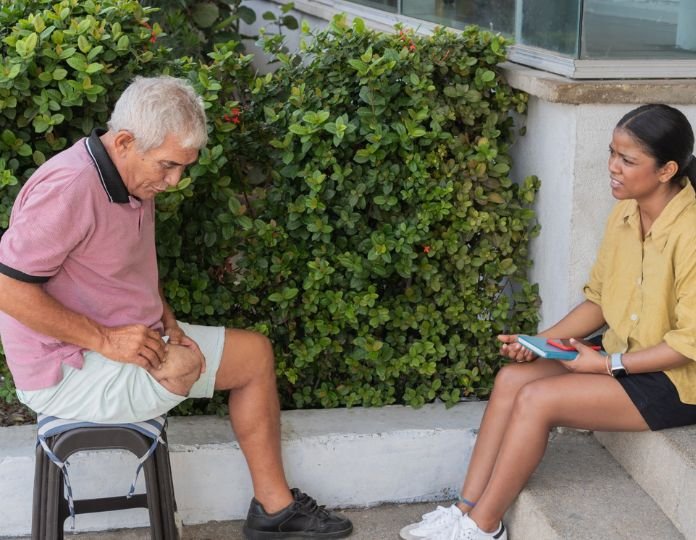Physical injuries go beyond bodily scars. Most of such injuries are experiences manifested deep within our psyche, shaking the very foundations upon which our sense of self, resilience, and emotional well-being. Research consistently shows that there’s a complex interconnection between physical trauma and mental health, which reveals a relationship that is far more intricate than the traditional medical approaches.
Read More: How Does Trauma Affect Brain Function?
The Immediate Emotional Impact of Injury
Whenever an injury happens, the psychological response to it is immediate and has many sides to it. Individuals experience a plethora of emotions that can be as impactful as physical pain. The spectrum of emotional responses includes shock, denial, fear, frustration, and a sense of vulnerability.
According to Counseling Psychologist Dr. Sumathi Chandrasekaran, when a physical injury occurs, the body immediately responds due to a natural stress response. The reaction depends on the severity of the injury, and it differs from person to person. For instance, a small fall may feel more intense for someone with a sensitive personality. Resilience is crucial in coping with the shock of any physical injury.
Several factors define how a person reacts when experiencing a physical injury. One significant factor is the discomfort caused by pain. When injured, the body experiences inflammation, sending continuous signals to the brain about the state of safety. The nervous system’s primary function is to assess whether the body is safe or in danger, which is essential for survival. It sends signals to the brain, with 80% of the communication coming from the body and only 20% from the brain. This highlights the importance of how the body feels, making even a small injury potentially traumatic, depending on the individual’s emotional resilience.
Read More: Understanding Pain Management in Relation to Psychology
The Psychological Stages of Injury Response
Researchers have identified several key psychological stages that individuals typically experience following a significant injury:
- Initial Shock and Disorientation: An immediate protective psychological response that buffers the individual from overwhelming emotional pain.
- Anxiety and Uncertainty: Characterized by persistent worries about recovery, future capabilities, and potential lifestyle changes.
- Grief and Loss: a grieving state induced as a result of temporary or permanent loss of bodily functions and identity.
- Adaptation and Recovery: The slow development of new coping mechanisms; rebuilding one’s narrative.
- Adaptation and Resilience: The gradual process of developing new coping mechanisms and reconstructing personal narrative.
Physiological and Psychological Attachment
While the body and mind condition correspondingly, they form a separate organic entity. All chronic pains that most people try to avoid experience, manifest through perception and thus are always complex happenings with a severe impact on mental health. It is seen in scientific studies that ongoing physical discomfort can create very strong psychological responses:
- Heightened anxiety
- Persistent depression
- Disrupted sleep patterns
- Reduced emotional resilience
- Compromised cognitive functioning
Dr Sumathi further explains that daily routine disruption plays a significant role in the psychological impact of injury. For instance, someone who regularly enjoys walking may feel a loss when they cannot continue that activity due to injury. This disruption extends beyond physical limitations; it also creates a sense of missing out on personal time and self-care.

Another aspect of emotional distress related to injury is the loss of independence. Individuals who value their independence may struggle when they have to rely on others for assistance. This goes against their core beliefs and values, which may lead them to question their identity.
In addition, the future often looms large in the mind of someone recovering from an injury. The mind tends to wander, and this can lead to anxiety about future limitations and challenges, depending on the person’s emotional resilience and coping strategies.
Additionally, a person’s self-image can be significantly affected by the injury, particularly if it involves visible body parts like the face or if it alters the way they move. The fear of being seen as weak or different can further impact mental well-being. The isolation that often accompanies recovery also plays a role in feelings of disconnection, potentially leading to depression.
Read More: Psychological Impact Of Acid Attack On Its Victims/Survivors
The Bidirectional Nature of Injury and Mental Health
Emerging research demonstrates that mental health conditions can impede physical recovery. Individuals experiencing psychological distress often encounter:
- Slower healing rates
- Increased pain perception
- Prolonged rehabilitation periods
- Higher risk of medical complications
- Compromised immune system response
Long-Term Psychological Consequences of Physical Trauma
The impact of physical injuries extends far beyond the immediate recovery period. Many individuals continue to wrestle with complex psychological effects that can persist for months or even years:
- Chronic Anxiety: Persistent worry about future physical capabilities
- Reduced Self-Esteem: Connected to perceived loss of functionality
- Depression: Stemming from perceived loss of independence or identity
- Body Image Challenges: Particularly significant for individuals with visible injuries or permanent physical alterations.
- Post-Traumatic Stress Disorder (PTSD): It involves intrusive memories, arousal that is extensive and avoidance behaviour.
Read More: PTSD: Symptoms, Diagnosis and Treatment
Dr Sumathi notes that depression is not just a psychological issue; it can be considered a physical condition as well. Inflammation in the body triggers the release of neurochemicals, affecting both the nervous system and emotional state. This disconnection between the mind and body can intensify feelings of loneliness and vulnerability, contributing to depression. As the mind and body become disconnected, it becomes challenging for the person to integrate their feelings and rationalize their emotions.
The key to navigating this experience, Dr. Sumathi emphasizes, is emotional resilience. She highlights the importance of the “4 Cs” for resilience: Connection, Courage, Confidence, and Clarity. These qualities help individuals cope effectively with challenges. Emotional resilience accounts for 90% of the response to an injury or trauma, while only 10% is related to the situation itself.
Athletes: A Unique Psychological Landscape
For athletes, injuries are more than just some physical setback. They are profound psychological disruptions that challenge core identity, professional aspirations, and self-worth. The mental health implications can be as significant as the physical injury itself.
Psychological Challenges Specific to Athletes
- Loss of athletic identity
- Emotional vulnerability
- Anxiety about career longevity
- Fear of permanent performance reduction
- Potential financial and professional uncertainty
Read More: Elite Athletes and Their Struggles with Mental Health
Holistic Recovery Strategies
Comprehensive recovery requires a multidimensional approach that addresses both physical and psychological aspects of healing:
Integrated Recovery Techniques
- Mindfulness Practices: Stress reduction and emotional regulation techniques
- Personalized Rehabilitation Programs: Addressing individual psychological needs
- Cognitive-Behavioural Interventions: Strategies to reframe negative thought patterns
- Support Group Participation: Connecting with individuals sharing similar experiences
- Mental Health Screenings: Regular psychological assessments during physical rehabilitation
To overcome the emotional and psychological impact of an injury, Dr. Sumathi offers several strategies. The first step is acceptance. When faced with a challenge, the reality must be accepted, and the individual must then determine what meaning they will assign to the situation. The meaning given to an injury can shape the experience, either fostering healing or spiralling into negative emotions like guilt or regret.

Mindfulness is another vital practice Dr. Sumathi recommends. By staying present in the moment and connecting with the body, individuals can counter the disconnect that often accompanies physical injury. Mindfulness helps individuals integrate their mind and body, allowing them to process emotions and promote healing.
Visualization also plays a significant role in recovery. By imagining the future self—healthy, active, and free from injury—the brain begins to align with that vision, activating the body’s capacity to heal. The Reticular Activating System (RAS) filters the overwhelming amount of information the brain receives and focuses on what is emphasized. Therefore, by focusing on healing and improvement, individuals can train their brains to prioritize recovery.
Gratitude is another important tool in the healing process. Dr Sumathi suggests practising gratitude daily, even for the small things, such as appreciating the body parts that are still functioning well. This shift in focus from what is lacking to what is present can help reduce negative emotions and promote healing.
Read More: How 6 Toxic Self-Care Trends Are Quietly Harming Your Well-Being
Systemic Challenges in Comprehensive Care
Despite clear evidence supporting integrated treatment, significant obstacles prevent holistic care:
- Financial constraints
- Fragmented medical systems
- Persistent mental health stigma
- Limited healthcare provider awareness
- Lack of standardized psychological support protocols
The Evolving Role of Healthcare Providers
Medical professionals must go with a more understanding approach to patient care:
- Develop interdisciplinary care models
- Implement routine mental health screenings
- Create personalized, holistic rehabilitation strategies
- Recognize emotional recovery as crucial as physical healing
- Provide patient education about psychological aspects of injury
Read More: The Hidden Pace of Healing: Why Recovery Takes Its Own Time
Cultural and Societal Perspectives on Injury and Mental Health
Different cultures approach injury and psychological recovery through unique lenses, highlighting the complex social dimensions of healing. Contradictory before, western medicine prioritizes physical treatment for ailments. At the same time, eastern and indigenous holistic therapies embody a much broader spectrum of body, mind, and spirit.
Cross-Cultural Healing Perspectives
- Traditional Chinese Medicine: Views injuries as disruptions in energy flow, addressing physical and emotional healing simultaneously
- Indigenous Healing Practices: Incorporate community support, spiritual rituals, and holistic recovery approaches
- Psychological Anthropology: Examines how cultural beliefs shape individual experiences of injury and recovery
Neurobiological Mechanisms of Injury and Psychological Trauma
Recent neuroscience research reveals fascinating insights into how physical injuries impact psychological functioning at a biological level:
Neurochemical Changes During Trauma
Physical injuries trigger complex neurochemical responses that extend beyond immediate physical trauma:
- Stress Hormone Dysregulation
- Prolonged cortisol elevation
- Increased inflammation markers
- Altered hypothalamic-pituitary-adrenal (HPA) axis functioning
- Neuroplastic Adaptations
- Altered neural pathway connections
- Brain region changes in pain perception
- Potential long-term neurological modifications
Technological Innovations in Integrated Recovery
Emerging technologies are revolutionizing comprehensive injury rehabilitation:
Cutting-Edge Recovery Approaches
- Virtual Reality Rehabilitation
- Pain management techniques
- Psychological exposure therapy
- Cognitive reconstruction programs
- Wearable Technology
- Mental health tracking
- Personalized recovery monitoring
- Real-time psychological intervention triggers
- Artificial Intelligence
- Early intervention identification
- Personalized rehabilitation strategies
- Predictive mental health risk assessment
Read More: What is Virtual Reality Therapy (VRT)?
Socioeconomic Dimensions of Injury and Mental Health
Injury recovery is not just a medical challenge but a complex socioeconomic issue:
1. Economic and Social Impact
- Financial Stress: Medical expenses, lost work productivity
- Social Support Systems: Role of family, community in recovery
- Professional Challenges: Career interruption, workplace adaptation
- Insurance and Healthcare Access: Barriers to comprehensive treatment
2. Gender and Demographic Considerations
Research indicates significant variations in injury recovery experiences across different demographic groups:
- Age-Related Recovery Patterns
- Cultural Background Influences
- Socioeconomic Disparities in Treatment
- Gender-Specific Psychological Responses
Preventative Strategies and Resilience Building
Beyond treatment, the focus is shifting towards preventing psychological complications from physical injuries:
- Early Psychological Screening
- Resilience Training Programs
- Community Support Networks
- Comprehensive Risk Assessment
Future Research Directions
Emerging research areas promise a deeper understanding of injury-mental health connections:
- Integrated treatment models
- Long-term neuroplastic changes
- Personalized rehabilitation technologies
- Genetic predisposition to psychological trauma
Professional Recommendations
Experts recommend a comprehensive approach to injury recovery:
- Ongoing mental health support
- Interdisciplinary treatment teams
- Routine psychological assessments
- Personalized rehabilitation strategies
- Patient education and empowerment
Routine and structure are also key to recovery. Establishing a daily routine helps calm the mind and body, allowing the brain to secrete happy chemicals, which in turn aids in emotional and physical healing. In conclusion, Dr. Sumathi emphasizes that recovery from a physical injury is as much about emotional and mental resilience as it is about physical healing. By staying connected to the body, maintaining a positive mindset, practising mindfulness, and focusing on small, achievable goals, individuals can navigate the challenges of injury and emerge stronger.
Read More: Building a Strong Mind: Practical Steps for Enhancing Psychological Resilience
Final Reflections: A Holistic Vision of Healing
The journey of recovery transcends physical restoration. It is a profound, complex process of personal transformation, requiring compassion, understanding, and integrated care. Healing is not about returning to a previous state but about growth, adaptation, and discovering newfound resilience.
According to Clinical Psychologist Gavneet Kaur Pruthi, individuals should consider seeking therapy after a physical injury even if they don’t initially notice mental health issues. Physical injuries can have psychological effects that may not be immediately apparent. Here are several reasons why therapy can be beneficial:
- Emotional Impact of Trauma: Injuries can be traumatic leading to feelings of vulnerability, fear, or distress. Therapy can help process these emotions.
- Chronic Pain and Stress: Living with pain or undergoing a long recovery can lead to stress, frustration, and even depression. A therapist can provide coping strategies to manage these challenges.
- Adjustment to lifestyle changes: An injury might require adjustment to daily routines, work, or social activities. Therapy can support individuals in adapting to the changes.
- Preventive Care: Even if no mental health issues are apparent, therapy can help build resistance and provide tools to handle potential stressors that arise during recovery.
- Mind-Body Connection: Mental health significantly influences physical recovery. Addressing psychological well-being can promote a more holistic healing process.
Scoping therapy doesn’t mean there is a problem, it can be a proactive step toward comprehensive recovery and long-term well-being.
Conclusion: Embracing Comprehensive Healing
Physical injuries represent life events that challenge our understanding of health, resilience, and even recovery. Understanding the deep link between physical trauma and mental health can help us build better, more compassionate healing models. The future of medical treatment is understanding a holistic view of people as complex interlinked systems in which physical and psychological health are invariably intermingled.
References +
Cramer, H., Waldmann, T., Villmann, T., & Helms, E. (2021). Physical and mental health consequences of traumatic injury: A systematic review. Journal of Psychosomatic Research, 143, 110392. https://doi.org/10.1016/j.jpsychores.2020.110392
Zatzick, D. F., Rivara, F. P., Jurkovich, G. J., Hoge, C. W., Wang, J., Fan, M. Y., Petrie, M., Darnold, O., Garvin, E., & Maier, R. G. (2019). Dissemination of a collaborative care model to improve mental health outcomes after acute trauma. Psychiatric Services, 70(11), 1002-1008. https://doi.org/10.1176/appi.ps.201800530
Holbrook, T. L., Hoyt, D. B., & Coimbra, R. (2020). The impact of major trauma: Quality-of-life outcomes are poorer in survivors of physical trauma compared to survivors of medical critical illness. Journal of Trauma and Acute Care Surgery, 88(3), 372-379. https://doi.org/10.1097/TA.0000000000002568













Leave feedback about this